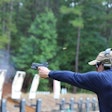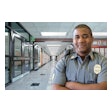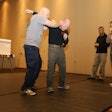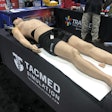Each July in Cheyenne, Wyo., when the rodeo comes to town, it bursts forth with all the pent-up energy of a bucking bronc released from the chute. After all, Cheyenne Frontier Days, a celebration focused around the worlds largest outdoor rodeo, is the culmination of nearly a year of preparations by volunteers who live in the close-knit community.
Campgrounds are readied, and grandstand facilities spruced up. Livestock are shipped in, sorted, and tended. Big-name country music acts are booked, and parade routes are marked out. Residents dress up and act out the roles of Wild West gunslingers, merchants, and others in a recreated Old West Town.
In the middle of it all are the men and women of the Cheyenne Police Department, who watch a community of about 55,000 swell into a city of nearly half a million during the 10-day western celebration. Wrapped around the pro rodeo (and its hefty $1 million purse) are nightly concerts by well-known Nashville artists, four western parades, an air show hosted by nearby F.E. Warren Air Force Base, and a real-life cattle drive through city streets.
"It kind of brings the whole city to life," says Sgt. Rick Wood, who has worked eight Cheyenne Frontier Days celebrations as a member of the Cheyenne Police Department. "We have a lot of tourists, lots of traffic and pedestrian traffic in downtown areas. The nightclubs and bars are usually full-up until closing time.
"There is a lot of community policing during Frontier Days-a lot of going out and meeting the tourists, giving directions, helping them find things."
Supporting the event is a veritable army of volunteers-some 2,500 residents who do everything from taking tickets at the carnival midway to providing medical care to injured rodeo cowboys. Cheyenne PD is represented in the all-volunteer Security Committee, which oversees traffic plans, concert security, and private security patrols. The department also works with the Military Committee, which provides a variety of logistical support services using Warren Air Force Base security police and others.
"The police department works with us, hand in glove," says Ken McCann, Frontier Days general chairman. "As part of the planning process, our different committees meet with the chief and numerous other officers. We're in the entertainment business and constantly changing the things we're doing: traffic control, vehicle parking, public relations, and crowd control. They have a lot of expertise in areas that we don't have."
With the sudden influx of visitors, the demand for police assistance escalates. And while most calls are what you'd expect-disorderly conduct, underage drinking, larcenies and the like-the rodeo generates its own share of memorable calls. Two years ago, Cheyenne police cited a horse-mounted parade official for rude and indecent behavior after he lassoed a tow truck driver during a pre-parade confrontation. Officers have also worked horse-drawn wagon vs. passenger car crashes, and assisted with runaway livestock.
"Last year, at the beginning of my shift, I had gotten into my patrol car and half a block from the station, I saw a horse running down one of the busiest streets in Cheyenne," says Wood.
As it turned out, the animal had escaped from the Wild Horse Races, a popular event in which teams attempt to saddle and ride unbroken horses. The fugitive horse galloped a full seven miles before being recaptured by cowboys, with assistance from police officers and sheriffs deputies.
"I had my entire shift out there stopping traffic at intersections ahead of the horse, because we knew the direction it was running," Wood says. "Our biggest concern was that we didn't want to have any accidents, and of course didn't want to hurt the horse."
Interagency cooperation is illustrated in grandest form during the annual, 10-mile cattle drive of Corriente steers, used in steer-wrestling and roping events. Cowboys on horseback escort the 500 head of cattle along Interstate 25 from pastures north of the city, while the Wyoming Highway Patrol keeps traffic from pulling over to watch. When the animals are herded onto city streets, Cheyenne PD officers assume responsibility for traffic and crowd control. And when the cattle reach the rodeo grounds, officers hand off security operations to arena staff and private security officers.
Last year, the police department also participated in a multi-agency emergency response training event for military personnel and first responders. In the scenario, lightning struck the grandstands during rodeo competition, injuring scores of fans. Percussion grenades, smoke bombs, and panicked "victims" in moulage makeup added realism to the drill, enabling first responders to practice triage and crowd-control skills.
For most of the year, Cheyenne (located about 100 miles north of Denver) is a low-key community that takes great pride in its western heritage, abundant wildlife, and unspoiled, wide-open spaces. Those attributes make it particularly attractive to outdoor-recreation-oriented officers, says Deputy Chief Bill Stanford.
"It's about an hour to get to anyplace of substance," says Stanford, who has almost 22 years on the department. "Wyoming is a tremendous place to be a hunter. Fishing is very popular. If you're into other outdoor activities, there's a lot of hiking, bicycling, camping, and climbing.
Cheyenne is also a city with a relatively low crime rate, averaging one or two homicides a year, and is home to residents who seem to appreciate the work officers do.
"Whether they are patrolling on foot, or out there by car, or mounted on horses, bikes, or motorcycles, they add a professional touch to our event, and an element of safety," says McCann. "People respect that."
Bryn Bailer, a former newspaper reporter, is a contributing editor for Police. By night, she is a member of the Tucson Police Department Communications Division.















